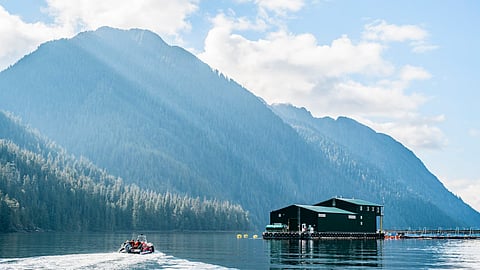

"We can make great things happen with the right framework for growth," CAIA President & CEO Timothy Kennedy said.
Photo: Cermaq Canada.
Canada has just changed government, and with a new election coming up in which polls predict a comfortable victory for the current prime minister, Mark Carney, the Canadian Aquaculture Industry Alliance (CAIA) recalled the new federal government that "Seafood farming is a critical economic solution for Canada."
A new federal government, CAIA said, must focus on reviving Canada's economy and, it added, aquaculture - also known as seafood farming, whether of fish, shellfish or seaweed - represents a huge economic opportunity that the country has a responsibility to develop sustainably.
In its statement, the national association that speaks for Canada's seafood farmers highlighted that aquaculture is an important, yet untapped, source of jobs and locally produced food that also supports environmental stewardship, Indigenous reconciliation, and community revitalization.
Last week saw the release of Canada's Ocean Supercluster's report, 'Blue Bioeconomy Insights', which provides an overview of opportunities for aquaculture, as well as other ocean-related biological and food innovations in the country, and is consistent with CAIA's analysis, which notes that Canada only utilizes 1% of its viable ocean area for aquaculture development.
To put it in perspective, the Canadian Aquaculture Industry Alliance compared it to Norway, which has about one-third of Canada's ocean potential but produces almost twenty times as much farmed seafood.
"Canada has the most cold-water aquaculture production potential in the world but we are not responsibly developing this," said Timothy Kennedy, CAIA President & CEO, and a Steering Committee member for the report.
"The global seafood industry is in the midst of historical change as precision farming grows the majority of healthy seafood for a growing global population," he continued. "It is the lowest carbon-footprint and most sustainable large-scale animal protein production in the world and should be embraced as a major opportunity for Canada."
Despite this potential, the association stated that Canadian production has been stagnant for twenty years. A situation that, according to CAIA, has been aggravated by the "Trudeau government's irresponsible decision" to ban open net-pen salmon aquaculture in British Columbia by June 30, 2029.
As a result of that announcement - made in June 2024 and which provoked an immediate and unanimous reaction not only from the aquaculture sector in British Columbia and across the country, but also from pro-salmon farming First Nations - it brought as an immediate consequence a sharp curb on all investment in the aquaculture sector across Canada.
As CAIA has recalled now, the decision was made even though open net-pen farming accounts for almost 99% of the world's farmed salmon production, and this species is the most popular seafood option in North America. That is why the Canadian Aquaculture Industry Alliance is now calling on the new government.
According to the association, there are three solutions immediately available to revitalize the sector. The first is that Agriculture and Agri-Food Canada (AAFC) should be given federal responsibility for all sector development activities to adequately support sustainable growth.
Second, a truly responsible pathway for salmon farming in British Columbia must be established that delivers science-based environmental outcomes, provides confidence and certainty to investors, generates employment, and supports First Nations right-holders to make decisions in their own territories. And third and finally, modernization of the federal shellfish management system must be achieved.
"Canada has a choice before it: continue to be complacent about this major opportunity, or seize the moment to make Canada more economically and food secure and revitalize coastal communities," Kennedy stated. "We can make great things happen with the right framework for growth," he concluded.
